Tara’s eight great laughters — transforming the eight demons and fears; relying on the Mother of the Buddhas
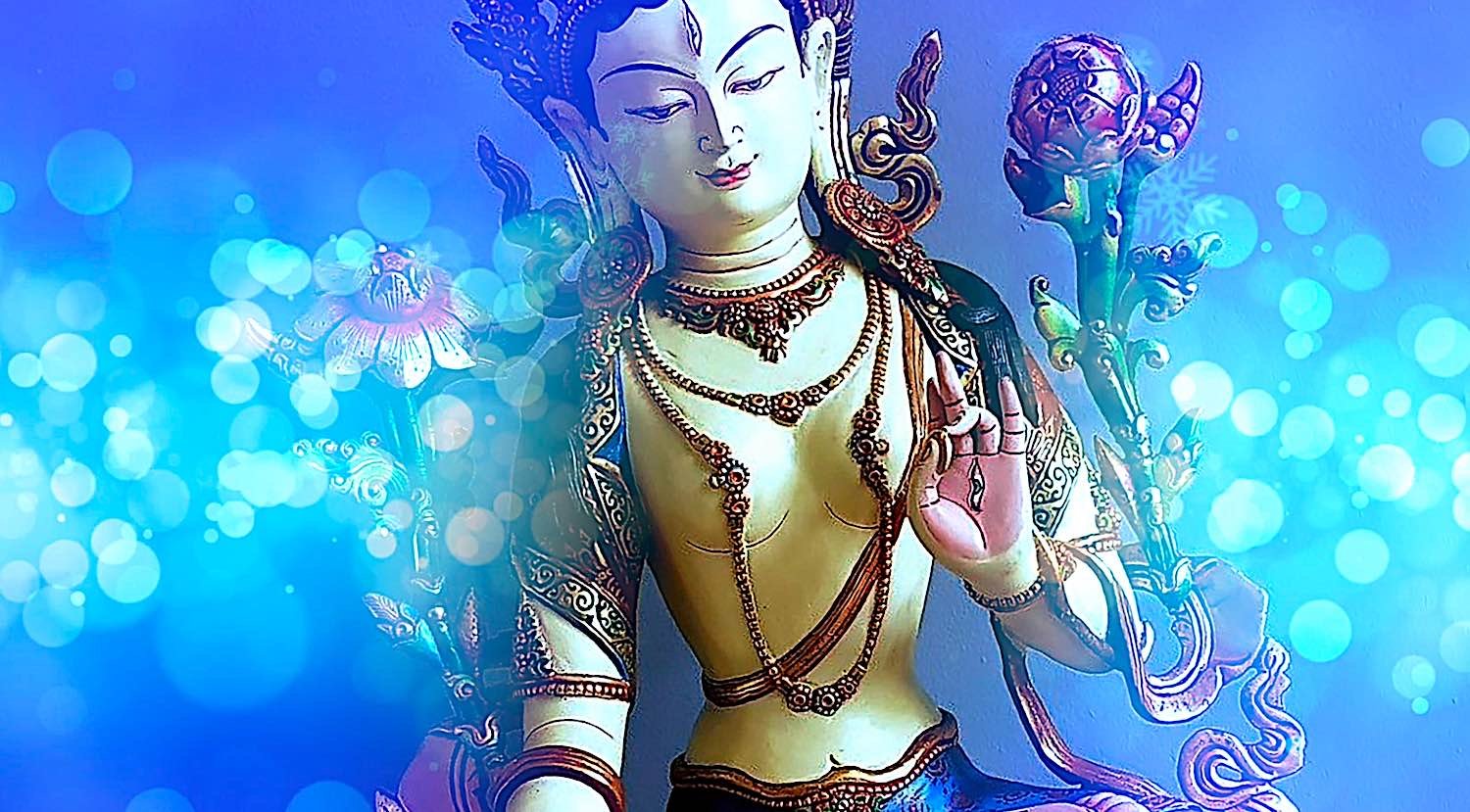
Even the great Conqueror Shakyamuni Buddha relied on Mother Tara’s “eight great laughters” to pacify fears, doubts, and demons. Tara is known as the Mother of All Buddhas because it is through Her Wisdom that all beings can attain Enlightenment. Traditionally, the Enlightened female represents “wisdom,” while the Enlighted male represents “compassion.” It is said, in many Tantras, that “all Buddhas relied on Tara.”
“The night preceding his awakening, while sitting under the Bodhi tree, Shakyamuni was attacked by a horde of demons attempting to divert him from his goal. At that moment, Tara appeared, and with eight great laughters made the demons fall to the ground and stopped them from doing harm. The Buddha then placed his mind in a state of perfect meditation and, at dawn, attained awakening. After that, he uttered the Tara Tantra.” — the great teacher Bokar Rinpoche, Tara The Feminine Divine[1]
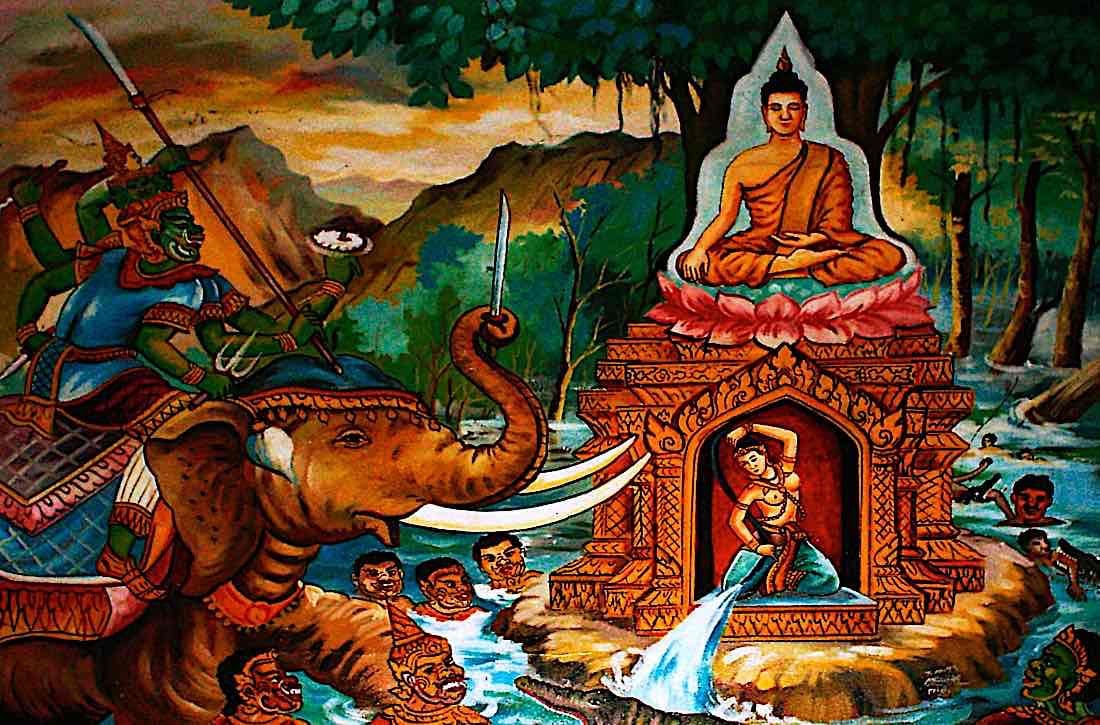
Homage to you who are so joyful,
With a garland of light around your crown,
And whose great laughter of TUTTARA,
Overpowers all the worlds and maras.
— 10th praise in the 21 Praises to Tara.
- For a feature on the 21 Taras according to Surya Gupta, see our previous 3-part series, here>>)
- See our special feature section on Tara, with over 20 features and growing>>
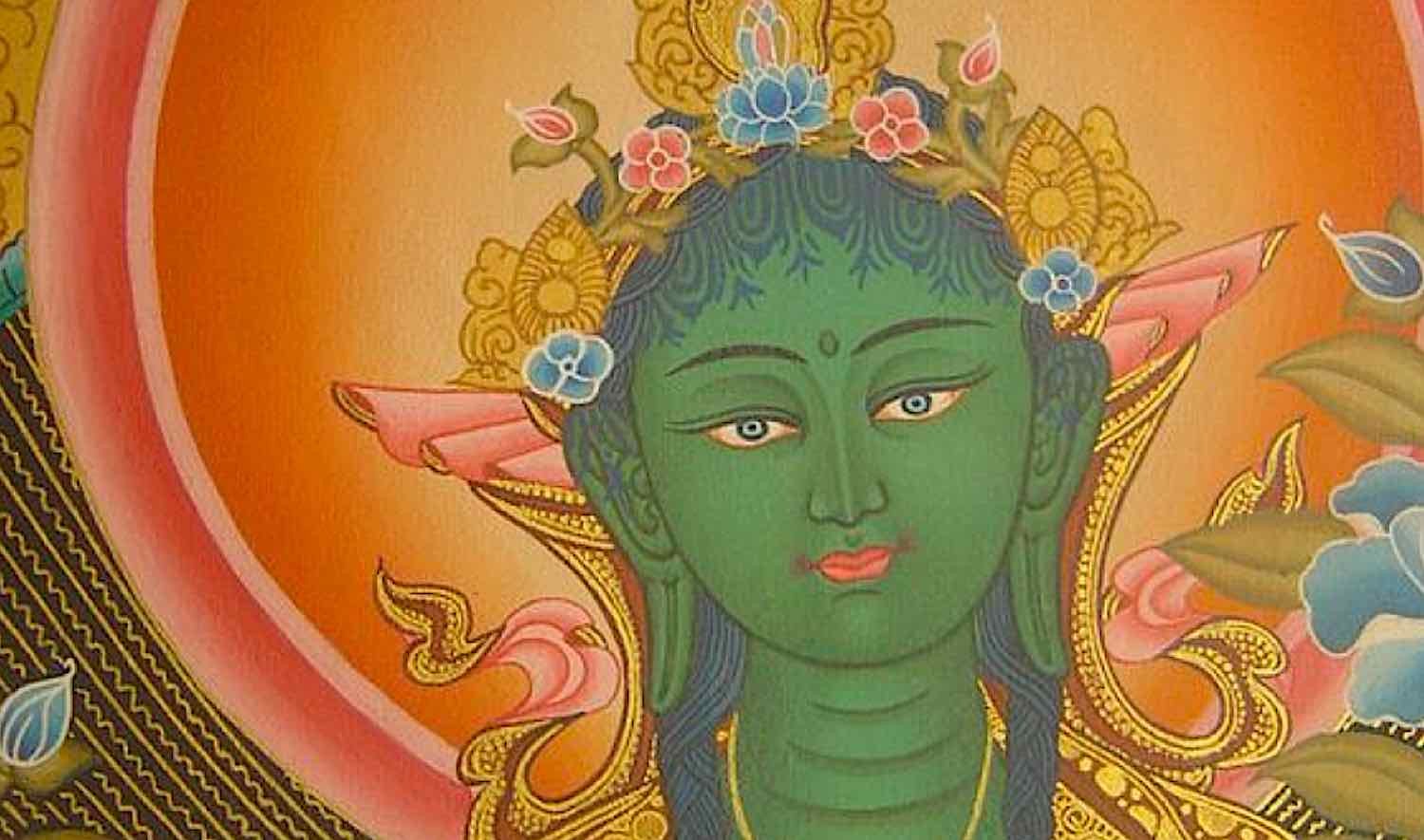
Tara’s Play Mind and the Eight Laughs
What are the Eight Fears Tara obliterates with her Wisdom laughter? When Buddha sat under the Bodhi tree, Mara threw every doubt and fear and seduction at the future Conqueror: charging elephants, demons, armies with weapons, clouds of arrows, and even Mara’s own seductive daughters. Against Tara’s Eight Laughters, all fell as the illusions they are. As Scrooge said to the ghost in Dicken’s A Christmas Carol: “There’s more of gravy than of grave about you, whatever you are!” Buddha had realized the Emptiness of all phenomena.[3]
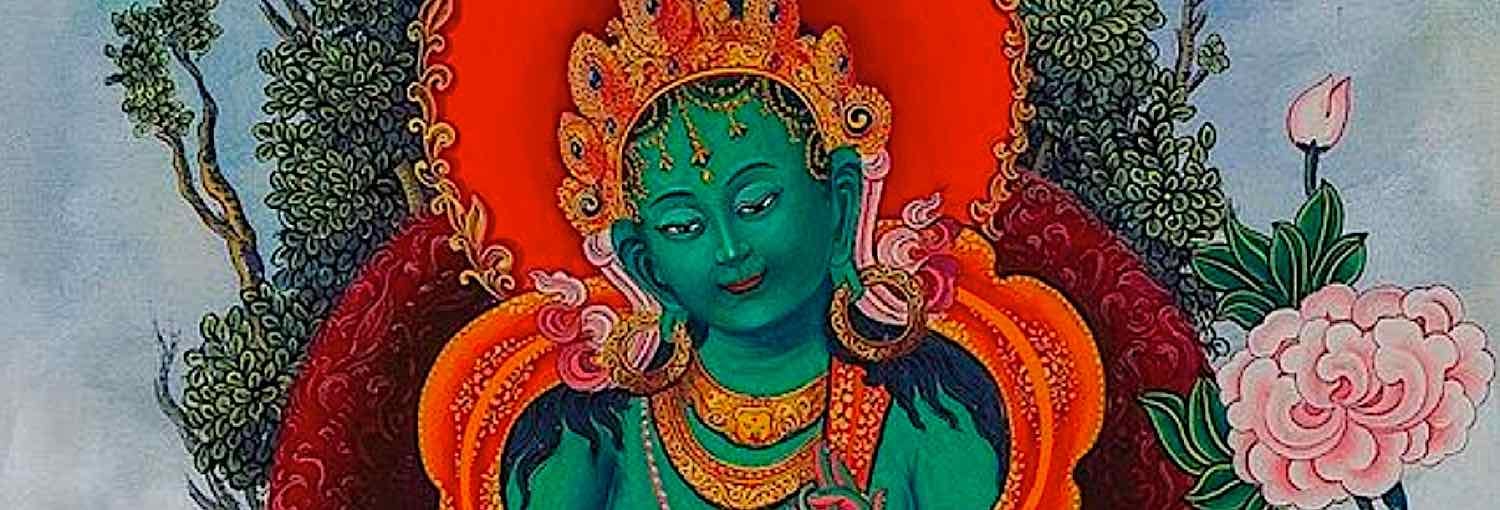
Thinley Norbu explores this as Tara’s “Play Mind” in Magic Dance: The Display of the Self-Nature of the Five Wisdom Dakinis.[2] What does Tara’s Play Mind mean? Thinley Norbu explains that Her playful mind is the remedy for those of us suffering in samsara — too serious and “tightly gripped by dualistic distinctions.” Instead, she shows us the wisdom of her “open heart.”
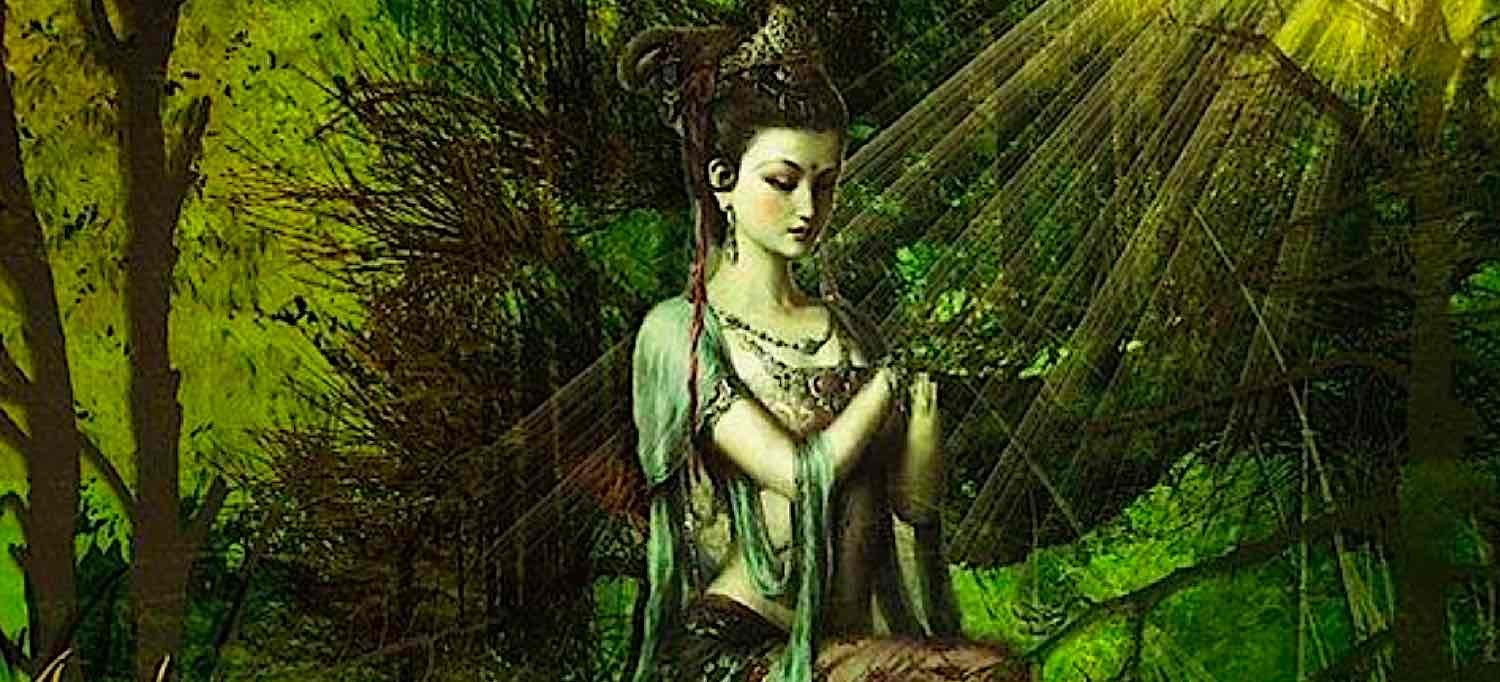
The Tenth Tara: “Praising Tara… and the sound of her laughter
Each day, many Buddhists around the world chant the 21 Praises to Tara. Each Tara is none other than Tara, but the praises celebrate the endless forms of Tara’s activity. In the Tenth Praise — here, quoted from Tara in the Palm of Your Hand[6], we praise the “sound of her laughter”:
Homage to you who are so joyful,
With a garland of light around your crown,
And whose great laughter of TUTTARA,
Overpowers all the worlds and maras.
Joy and laughter dispel darkness and gloom. It’s natural that “demons” — whether viewed as internal negative thoughts, or external beasties — would fear the humble power of the laugh. Interestingly, the tenth Tara known for her laugh, is “semi wrathful.
“The mantra of her speech, endowed with the eight modes of laughter −
HA HAA, HI HII, HE HAI, HO HAU
− empowers all beings, setting them on the path of liberation.”
— Tara Mandala [7]
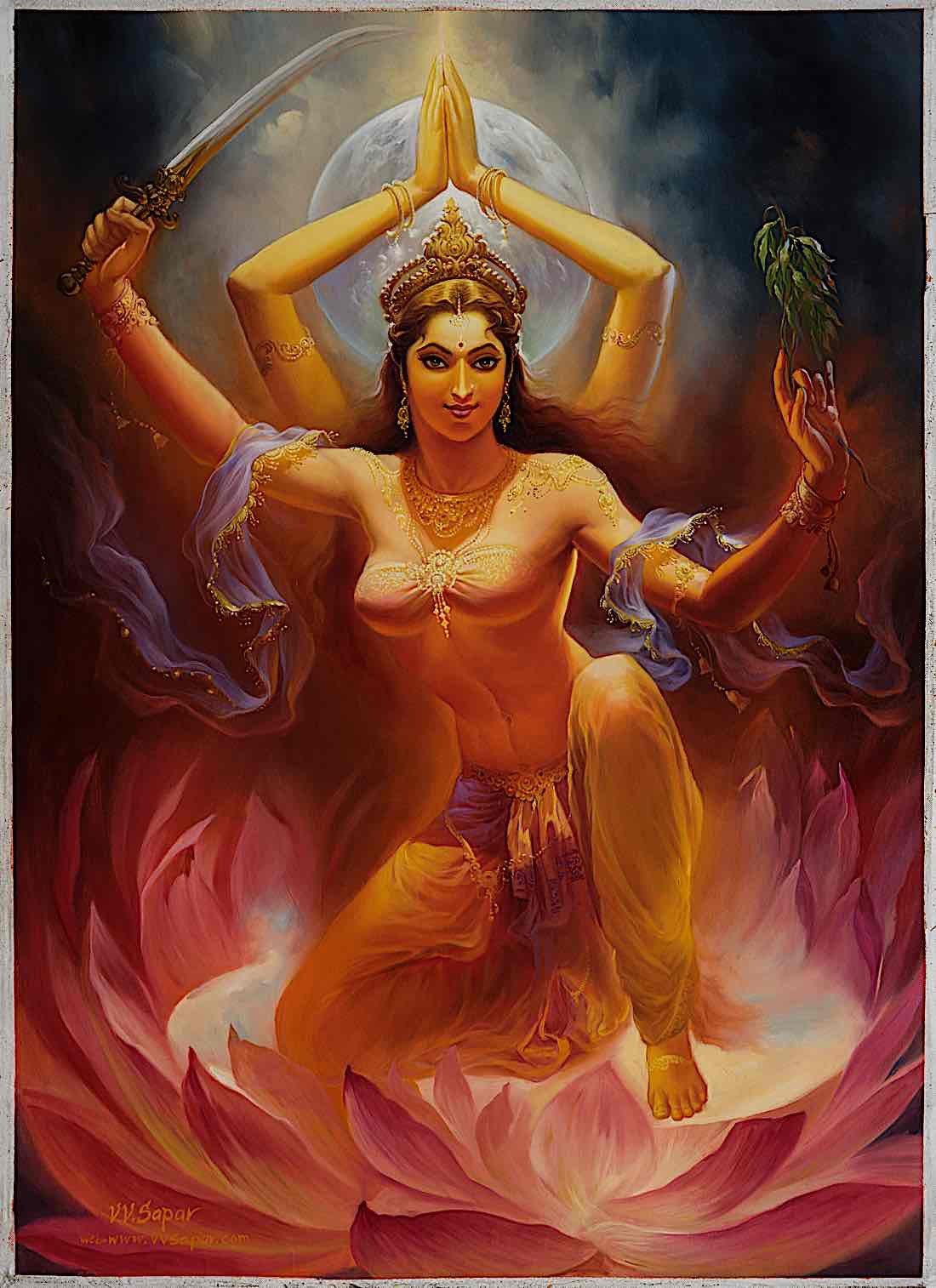
Zasep Rinpoche, in his commentary, explains the translation of the praise:
“In the first line, rab.tu.ga.wa means very joyful and happy while ji.pey means pleased. Tara helps all sentient beings find the inner happiness that comes from a peaceful mind. In particular she fulfills the wishes of her devotees who dedicate themselves to her practice. The second line praises the light that radiates from Tara’s crown ornament: u.gyan means crown ornament, and treng.wa.pel.ma means the light that is radiating in rings from it. In the third line, zhey.pa means laughter, while rab. means strong laughter. When Tara’s voice chants the mantra TARE TUTTARE, the sound is like divine laughter. In the fourth line, dud means maras, jig-ten means the world, wang.dun.dzey.ma means control. Thus, the sound of Tara’s mantra can subdue and control even the most powerful demons of the Desire Realm.” [6]
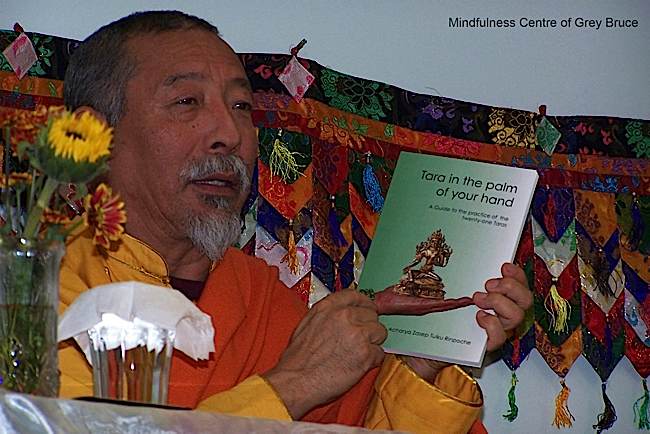
Tara is all about “accessibility”
In the amazing practice book Tara in the Palm of Your Hand, Zasep Rinpoche — who is known for he deep, abiding love of Tara — explains that one reason for Tara’s effectiveness as a practice is her accessibility:
“Tara is without a doubt the most beloved female deity in Tibetan Buddhism, revered for her swiftness in helping those who rely on her. She has been described as a Buddha for our modern age, a sublime personification of compassion and wisdom in female form at a time when sorrow and suffering seem to be increasing everywhere. Of all the Buddhas, Tara is the most accessible.” [5]
In his book, Zasep Rinpoche describes numerous examples of Tara’s saving activity in history. Tara literally will jump into action to save any of her children. Who are her children? Everyone.
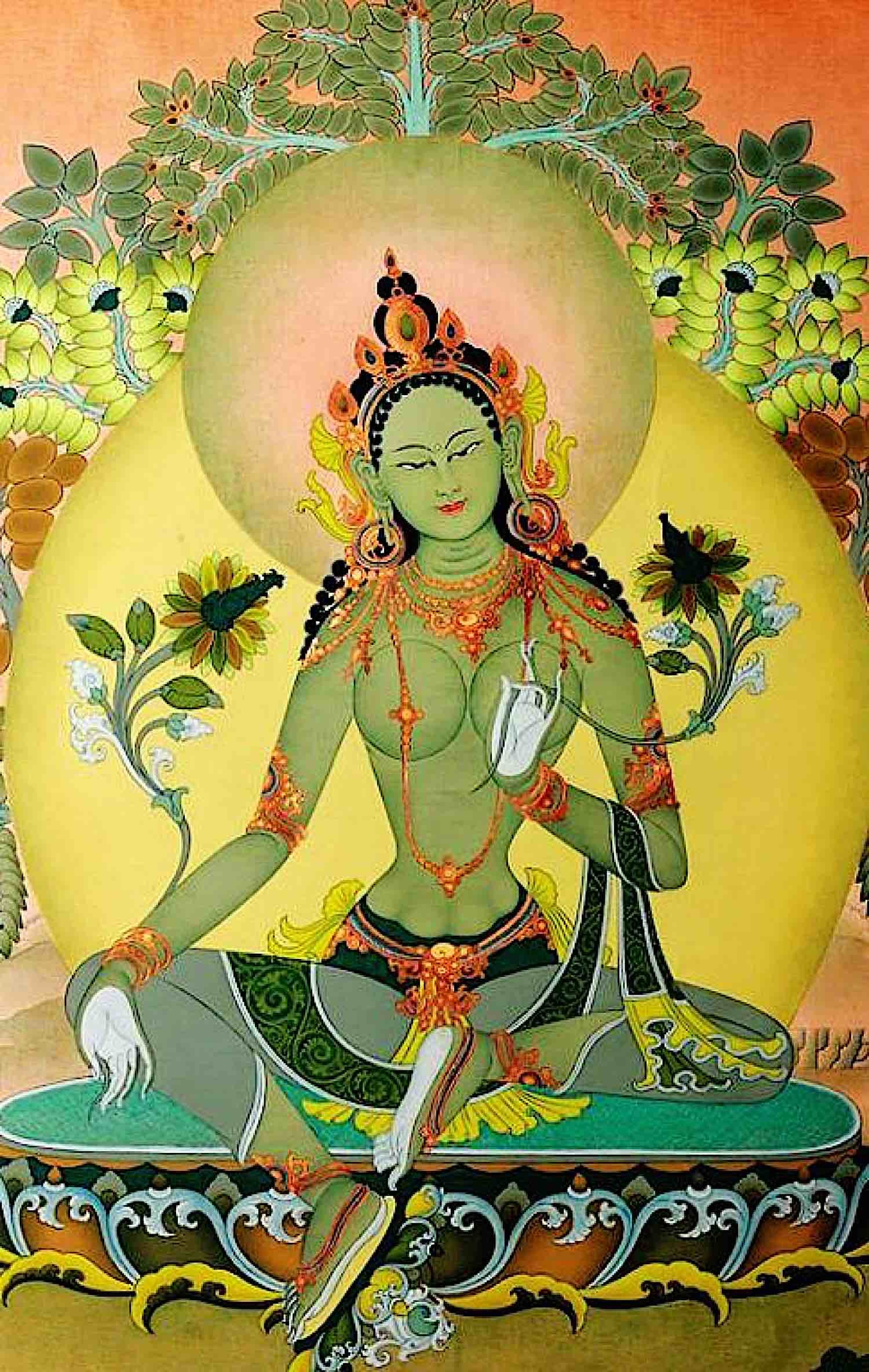
In the chapter describing how all beings have Buddha Nature, Zasep Rinpoche explains: “the Buddha known as Arya Tara, is no different from us. Tara is our idea of ourselves as a compassionate liberator become manifest.
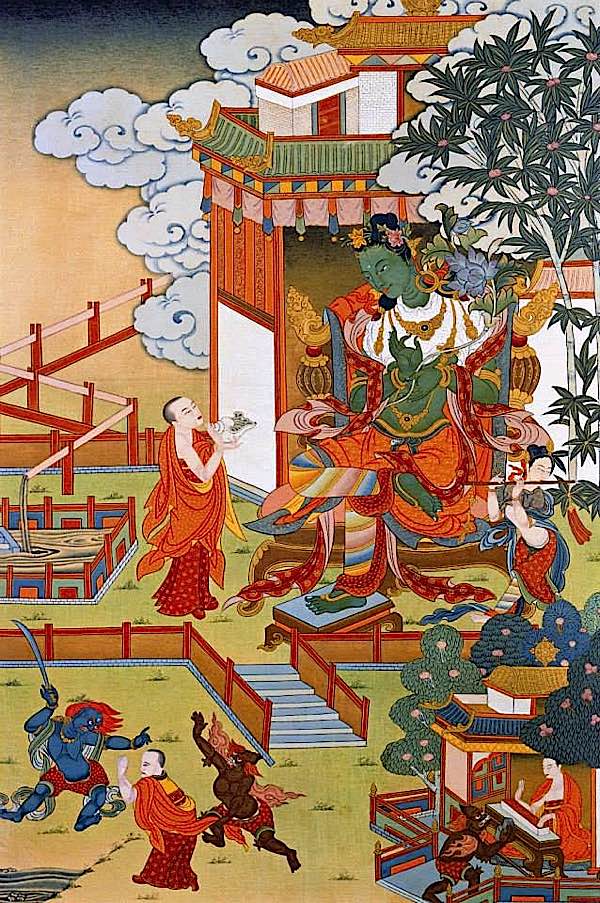
Tara as “guru… protector… friend”
In the 18th century praise of Tara “A song of longing for Tara, the Infallible” by Lama Lobsang Tenpey Gyaltsen — chanted by countless Buddhists every day — the central verse proclaims:
You are my guru, my yidam, my protector, my refuge, my food, my clothes, my possessions, and my friend. Since your divine quality is everything to me, let me spontaneously achieve all that I wish.
This verse focuses on not only the power of Tara but also her accessibility as our “best friend.” Earlier in the song, he wrote: “you are my best friend. Be close to me, Divine Mother, essence of love.”
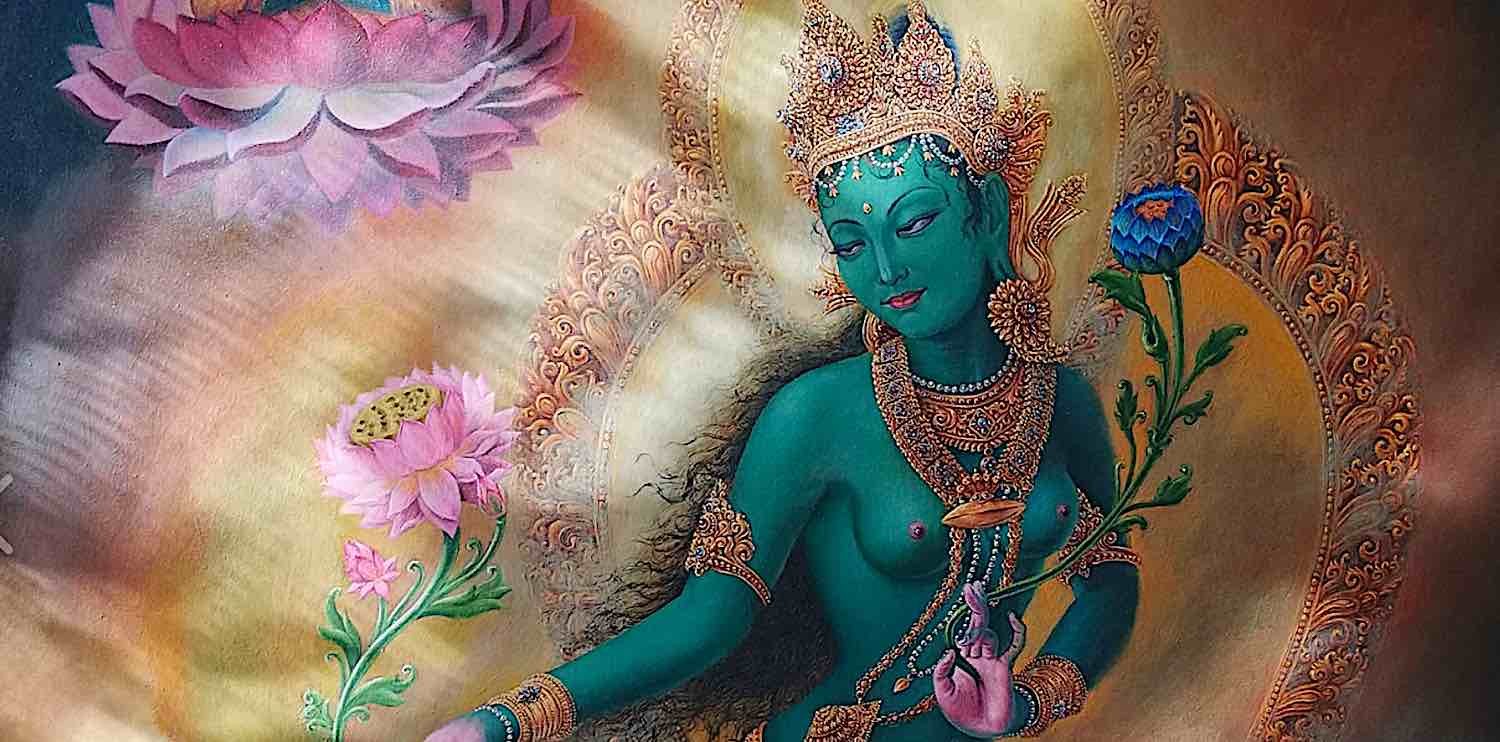
Tara, with her great laugh, her compassion, her all-inclusiveness, and her “activity in daily our daily lives” is one reason for her eternal appeal. All it takes to invoke her as “guru, yidam, protector, refuge or friend” is a simple thought — picture her laughing face — or her wonderful mantra:
Om Tare Tuttare Ture Svaha
Chanting Tara’s mantra is the easiest way to connect with her great kindness and protection:
Why is Playful Tara described as the Mother of the Buddhas?
There are three main reasons, all Buddhas and Bodhisattvas rely on Mother Tara:
- Tara manifests as Wisdom, which is the key to our liberation. One translation of Her name is “Mother of Liberation.”
- Tara protects us from fears, demons (internal or external, depending on how you interpret), and our doubts and obstacles. By removing obstacles she is again the “Mother of Liberation.”
- Tara, as a manifestation of Prajnaparamita, is Emptiness personified. It is through Emptiness and Oneness our fears and doubts fall away as the illusions they are.
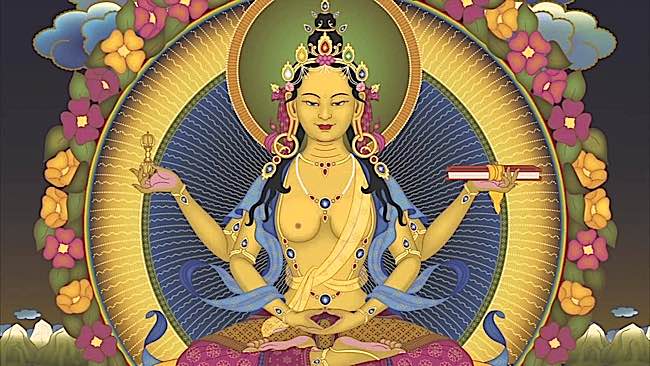
Tara laughs at the self-righteous
Why do we call them Tara’s laughs? Aside from the explanation of Tara’s tenth praise (see above), Tara is famous for “laughing at the self-righteous” and laughing at those who take themselves too seriously.[2] She’s as likely to help a prisoner in jail as a lama in a cave. She’s the ultimate “equal opportunity” Deva.
Another reason they are called her “eight laughs” is because she laughs at the illusion of these demons and obstacles who are nothing but a stray negative thought or a craving for something silly. There are eight fears, but all of them are worth nothing more than a laugh from the Glorious Goddess who saves us from the illusion of suffering. She is not making fun of us — but she is laughing at the so-called demons and fears who are nothing against Her Wisdom.
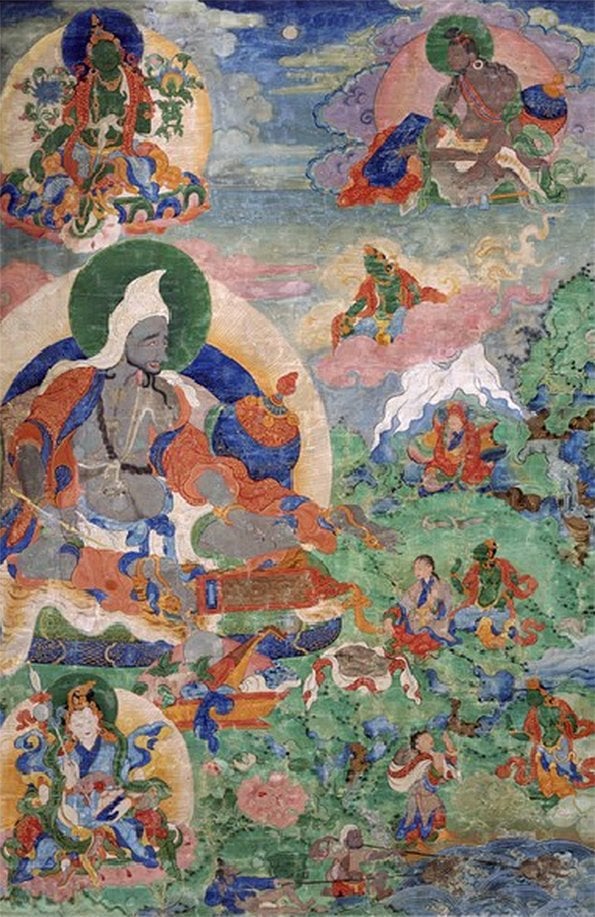
Laughing at the Great Yogis
In Martin Wilson’s In Praise of Tara, he describes the countless lineages of Tara in Tibet, describing her as the most popular Enlightened deity[4]. Inevitably, these tales and stories of Tara reveal a playful Tara, “teasing and laughing” at the great Yogis — from great Tilopa (988-1069 CE) to Atisha, who composed the great praise to the 21 Taras.
Her all-encompassing Play Mind and wisdom is the remedy for all fears. Imagine the lonely Yogi in her or his mountain cave, alone with their demons, bats, rats, bears and snakes. Their company would be their own playful mind — Tara Herself. If not for the playfulness of Tara, could they survive the austerities?
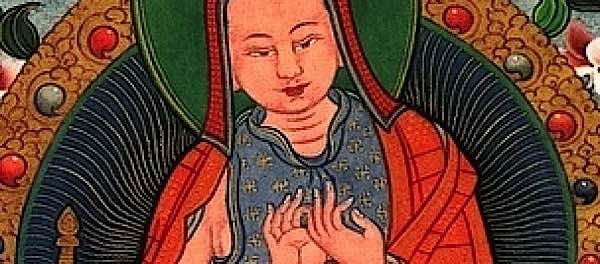
Saving us from tangible dangers?
Her insight and her laughter save us from not only the eight great fears — but all fears we can literally dream-up. The operative word being dream-up. Fears are entirely of our mind.
How does this save us, though from the eight dangers? Fears are one thing, but how can Tara literally save us from a danger. At the ultimate level that danger may be illusory, but in our relative reality, it is a very real danger. Can Tara’s laughter actually save us from thieves and monsters and charging lions?
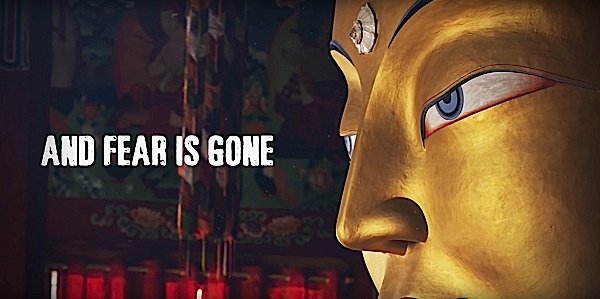
The answer, explains the great Bokar Rinpoche, is yes. In his book, Tara The Feminine Divine, he gives numerous real-world activities of Tara, saving those who call on her. He recalls how Tara saved them from the Chinese army when they fled to India. Another time, Tara saved his caravan from brigands. He tells numerous miraculous stories of Tara’s intervention.
At the ultimate level, Tara’s “Play mind” saves us from our own demons. At the relative level, for those with faith, she saves us from the relative dangers of samsara.
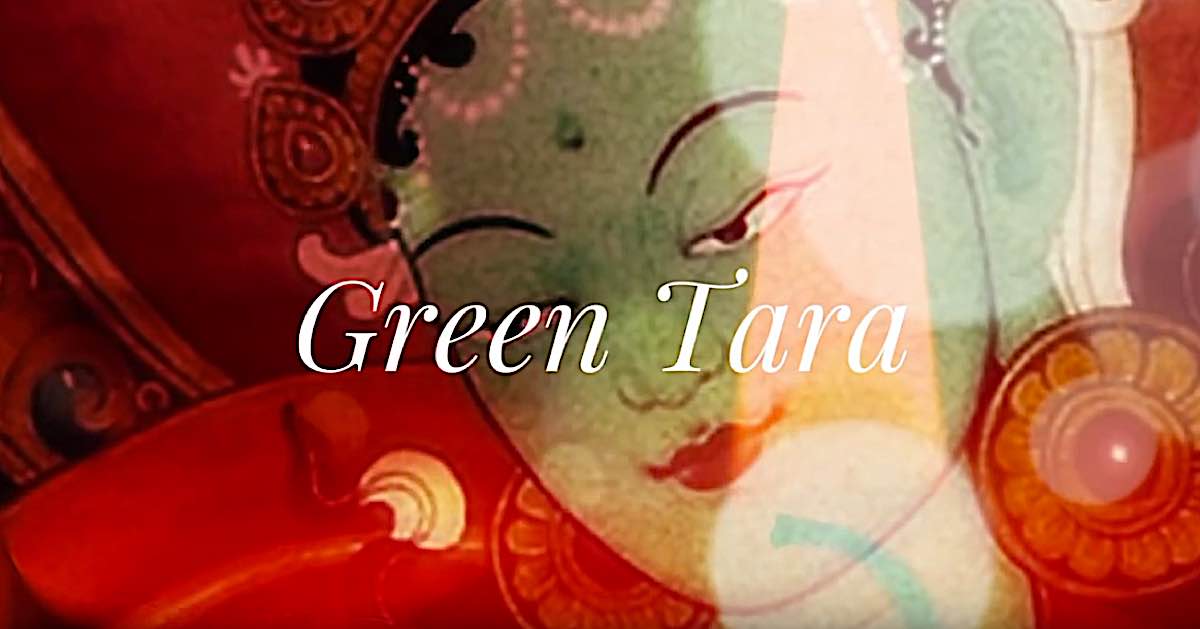
The Eight Great Fears
Bokar Rinpoche explains that the “Eight Great Fears” and eight laughters are not meant to limit Tara’s activity. They described typical “dangers” in India in the days of Buddha. Bokar Rinpoche, in Tara the Feminine Divine, writes:
“The list is not exhaustive. Tara protects against all dangers whatever they are when we call upon her to help us and pray to her with confidence.”
The Eight Great Fears also related to internal fears — which are the eight poisons that obstruct our mind and our practice — according to the teachings and commentaries:
- Elephants – also represent “blindness”
- Lions – also represent “pride”
- Fire – also represent “anger”
- Snakes – also represent “jealousy”
- Thieves – also represent “erroneous philosophies”
- Imprisonment – also represents “greed”
- Water – also represents “desire and attachment”
- Demons – also represent “doubts”
- For more on the Eight Fears, see our feature on the Sutra of Tara Saving from the Eight Fears>>
Bokar Rinpoche, however, gives very tangible examples of Tara’s activity in the book, including:
- Tara and the court case
- Tara reunites a family
- Tara protects the caravan from mauraders
- Tara’s saves the refugees
- Tara and Atisha
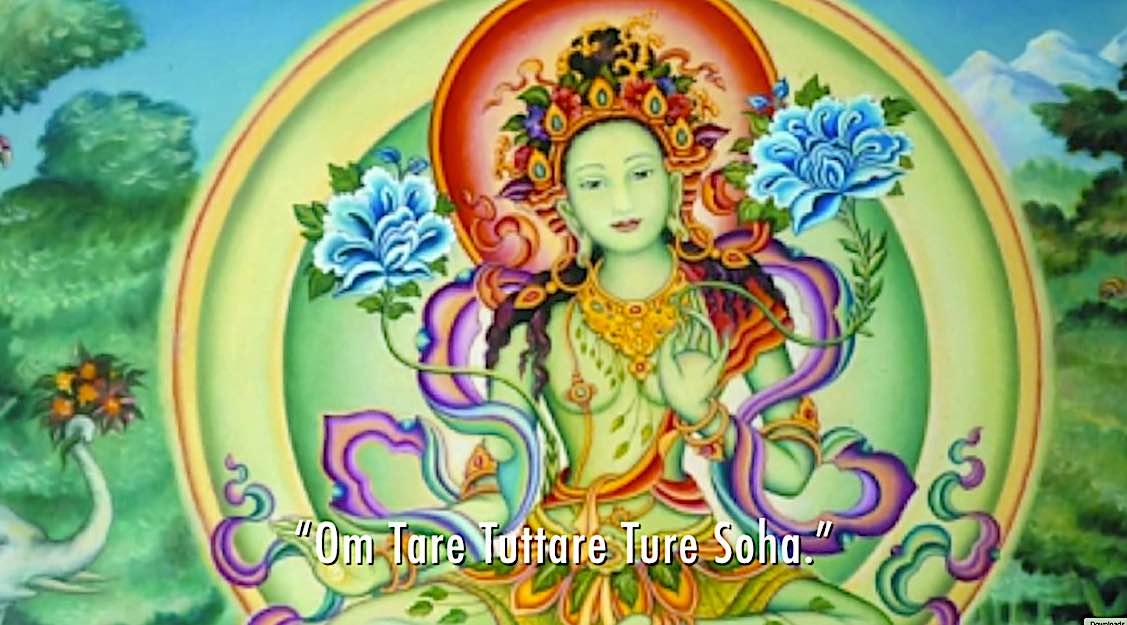
Celebrating Tara: every day is Tara Day
In Tibetan monasteries, most days start with Tara’s praise and practice. This helps connect our daily lives to our practice. The eighth day of the lunar month is also her special day — the first moon quarter (or eight days after the full moon) being special to her.
The best practice of Tara is bodhicitta — benefiting other beings. Tara especially treasures her followers who act with karuna and metta: compassion and love. The best practice of Tara is our daily lives, exemplifying these two traits.
Beginning the day with the twenty-one praises and her mantra is especially auspicious. (See below for English and Sanskrit versions.)
Chanting the 21 Praises to Tara, a Dharani of profound significance and power, in Sanskrit is a powerful way to tap into Tara’s fearlessness and protection:
21 Praises
Around the world, many people begin and end their day with Tara’s twenty-one praises. This practice has been credited with many benefits, including protection from harm, prosperity, and swift progress on the path of enlightenment. It can be chanted in Sanskrit, English or Tibetan.
It can be beneficial to chant this in the world’s oldest known language—Sanskrit. The nuances of this practice, the originating sounds, is similar to mantra practice. In Sanskrit:
Om namah spukasam namah Taraye mi Tara
1 Namas Tare Ture vire
kshanair dyuti nibhekshane
trailokya nat ha vaktrabja
vikasat kesharobhave
2 Namah shata sharac chandra
sampurna patalanane
Tara sahasra nikara
prahasat kira noj jvale
3 Namah kanaka nilabja
pani padma vibhu shite
dana virya tapah shanti
titik sha dhyana gochare
4 Namas tat hagatosh nisha
vijayananta charini
ashesha paramita prapta
jina putra nishevite
5 Namas Tuttara Hum kara
puritasha dig antare
sapta loka kramakranti
asheshak arshanak shame
6 Namah shakranala Brahma
marud vishvesh varachite
bhuta vetala gand harva
gana yaksha puras krte
7 Namas trad iti phat kara
para yantra pramardani
praty alid ha pada nyase
shik hi jvalakulek shane
8 Namas Ture maha ghore
mara vira vinashani
bhrku ti krta vaktrabja
sarva shatrum nishudani
9 Namas tri ratna mudranka
hrdyanguli vibhushite
bhu shitashesha dik chakra
nikara sva Karakule
10 Namah pramudita topa
muku ta kshipta malini
hasat prahasat Tuttare
mara loka vashamkari
11 Namah samanta bhu pala
patalakarshana kshame
chalat bhrku ti hum kara
sarvapada vimoch ani
12 Namah shikhanda kandendu
muku tabha ranojjvale
Amitabha jata bhara
bhasvare kirana dhruve
13 Namah kalpanta hutabhug
jvala malan Tara sthite
alidha muditabandha
ripu chakra vinashani
14 Namah kara talaghata
charana hata bhu tale
bhrkuti krta Hum kara
sapta patala bhedini
15 Namah shive shubhe shante
shanta nirvana gochare
svaha pranava samyukte
maha papaka na shani
16 Namah pramudi tabandha
ripu gatra vabhedini
dashakshara pada nyashe
vidya Hum kara dipite
17 Namas Ture pada ghata
Hum karakara bijite
meru mandara kailasa
bhuvana traya chalini
18 Namah sura sarakara
harinika karast hite
Tara dvir ukta Phat kara
ashesha visha nashani
19 Namah sura ganadh yaksha
sura kimnara sevite
abandha mudita bhoga
kali duhs vapna nashani
20 Namah chandrarka sampurna
nayana dyuti bhas vare
hara dvir ukta Tuttare
vishama jvara nashani
21 Namas tri tattva vinyasa
shiva shakti saman vite
graha vetala yakshaugha
nashani pravare Ture
Or, chant along in Tibetan
Chanted by Lama Tenzin Sangpo and Ani Choying Drolma:
21 Praises to Tara in English
The praises do lose some of the “mystery” and intensity and sheer sound-power in English, but the intention and praise is maintained. Many people chant the praise in English:
1 Homage to you, Tara, the swift heroine,
Whose eyes are like an instant flash of lightning,
Whose water-born face arises from the blooming lotus
Of Avalokiteshvara, protector of the three worlds.
2 Homage to you, Tara, whose face is like
One hundred full autumn moons gathered together,
Blazing with the expanding light
Of a thousand stars assembled.
3 Homage to you, Tara, born from a golden-blue lotus,
Whose hands are beautifully adorned with lotus flowers,
You who are the embodiment of giving, joyous effort, asceticism,
Pacification, patience, concentration, and all objects of practice.
4 Homage to you, Tara, the crown pinnacle of those thus gone,
Whose deeds overcome infinite evils,
Who have attained transcendent perfections without exception,
And upon whom the sons of the Victorious Ones rely.
5 Homage to you, Tara, who with the letters TUTTARA and HUM
Fill the (realms of) desire, direction, and space,
Whose feet trample on the seven worlds,
And who are able to draw all beings to you.
6 Homage to you, Tara, venerated by Indra,
Agni, Brahma, Vayu, and Ishvara,
And praised by the assembly of spirits,
raised corpses, Gandharvas, and all yakshas.
7 Homage to you, Tara, whose TRAT and PHAT
Destroy entirely the magical wheels of others.
With your right leg bent and left outstretched and pressing,
You burn intensely within a whirl of fire.
8 Homage to you, Tara, the great fearful one,
Whose letter TURE destroys the mighty demons completely,
Who with a wrathful expression on your water-born face
Slay all enemies without an exception.
9 Homage to you, Tara, whose fingers adorn your heart
With the gesture of the sublime precious three;
Adorned with a wheel striking all directions without exception
With the totality of your own rays of light.
10 Homage to you, Tara, whose radiant crown ornament,
Joyful and magnificent, extends a garland of light,
And who, by your laughter of TUTTARA,
Conquer the demons and all of the worlds.
11 Homage to you, Tara, who are able to invoke
The entire assembly of local protectors,
Whose wrathful expression fiercely shakes,
Rescuing the impoverished through the letter HUM.
12 Homage to you, Tara, whose crown is adorned
With the crescent moon, wearing ornaments exceedingly bright;
From your hair knot the buddha Amitabha
Radiates eternally with great beams of light.
13 Homage to you, Tara, who dwell within a blazing garland
That resembles the fire at the end of this world age;
Surrounded by joy, you sit with your right leg extended
And left withdrawn, completely destroying all the masses of enemies.
14 Homage to you, Tara, with hand on the ground by your side,
Pressing your heel and stamping your foot on the earth;
With a wrathful glance from your eyes you subdue
All seven levels through the syllable HUM.
15 Homage to you, Tara, O happy, virtuous, and peaceful one,
The very object of practice, passed beyond sorrow.
You are perfectly endowed with SOHA and OM,
Overcoming completely all the great evils.
16 Homage to you, Tara, surrounded by the joyous ones,
You completely subdue the bodies of all enemies;
Your speech is adorned with the ten syllables,
And you rescue all through the knowledge-letter HUM.
17 Homage to you, Tara, stamping your feet and proclaiming TURE.
Your seed-syllable itself in the aspect of HUM
Causes Meru, Mandhara, and the Vindhya mountains
And all the three worlds to tremble and shake.
18 Homage to you, Tara, who hold in your hand
The hare-marked moon like the celestial ocean.
By uttering TARA twice and the letter PHAT
You dispel all poisons without an exception.
19 Homage to you, Tara, upon whom the kings of the assembled gods,
The gods themselves, and all kinnaras rely;
Whose magnificent armor gives joy to all,
You who dispel all disputes and bad dreams.
20 Homage to you, Tara, whose two eyes – the sun and the moon –
Radiate an excellent, illuminating light;
By uttering HARA twice and TUTTARA,
You dispel all violent epidemic disease.
21 Homage to you, Tara, adorned by the three suchnesses,
Perfectly endowed with the power of serenity,
You who destroy the host of evil spirits, raised corpses, and yakshas,
O TURE, most excellent and sublime!
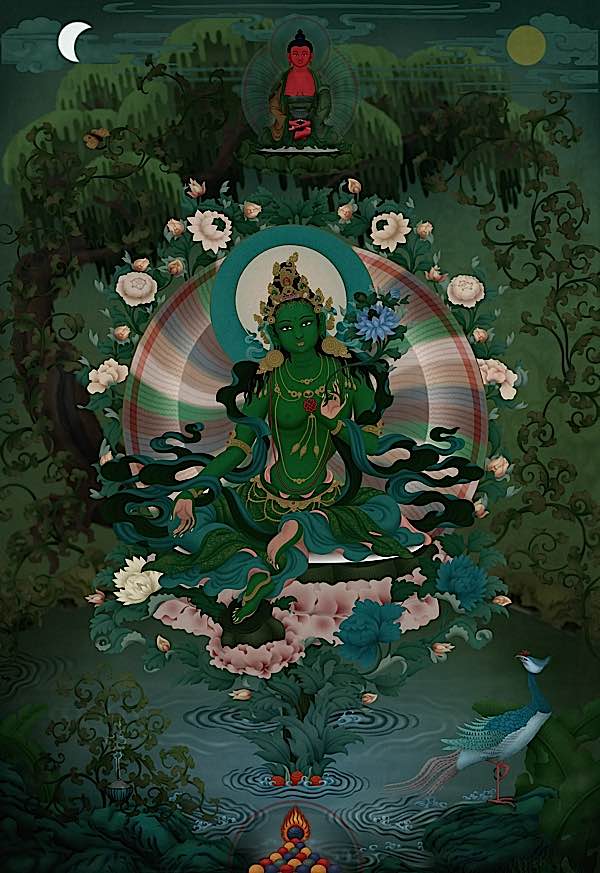
Song of Longing for Tara
One of the simplest and most elegant — and profound — daily practices is to simply recite or chant, from the heart, this famous and most profound prayer to Tara “Song of Longing for Tara” (Dung-bo-lu-me-ma) by Lozang Tanpa Gyaltsan. This remarkable enlightened Rinpoche wrote this at the age of 18, in 1852 — and it has become one of the most treasured and chanted prayers to Tara:
From my heart I bow to Divine Mother Tara, essence of love and compassion, the most precious objects of refuge gathered into one. From now until I reach enlightenment, hook me with your great love and kindness to liberate me.
By the witness of the Three Jewels, not just from my mouth but from the depths of my innermost heart and bones, I pray to you morning and evening. Show your blissful face to me, Loving One. Grant me the nectar of your speech.
Great gurus and small gurus cheat us with their made-up teachings, selling Dharma, teaching without comprehension, not observing who is qualified and who is not, being concerned about their own happiness and the eight worldly concerns. Since I can no longer trust friends of this degenerate age, you are my principal guru. Inspire me, Divine Mother, essence of love. Arouse the great power of your compassion and think
of me.I take refuge in you Tara; like you, no Buddha could ever deceive me. But understanding the odd character of these times, most Buddhas have gone into the bliss of nirvana. Even though they have great compassion, we have no connection. Since for me there are no other deities, you are my principal deity. Bestow realizations upon me, Divine Mother, essence of love. Arouse the great power of your compassion and think of me.
Most Dharma protectors do not show their powers. Tired of those who invoke them, they do not act. Other protectors, lacking insight but proud of their power, may be friendly for a while but will later do me harm. Since I cannot rely on other protectors, you are my principal protector. With divine action, Wisdom Mother, essence of love, arouse the great power of your compassion and think of me.
To ordinary view the names of objects are the same as their meaning. Like this, they produce afflictions and bind us to samsara. When it is time to die, unless I understand the true nature, could a wish-fulfilling gem enable me to carry even a sesame seed with me? Since I do not trust in illusions, you are my real richness. Please grant my desires, Divine Mother, essence of love. Arouse the great power of your compassion and think of me.
I cannot rely on the non-virtuous friends for even a day. They pretend to be close to me and all the while have in mind the opposite. They are friends when they wish it and enemies when they don’t. Since I cannot trust in this kind of friend, you are my best friend. Be close to me, Divine Mother, essence of love. Arouse the great power of your compassion and think of me.
You are my guru, my yidam, my protector, my refuge, my food, my clothes, my possessions, and my friend. Since your divine quality is everything to me, let me spontaneously achieve all that I wish.Although I am overwhelmed by my habitual, uncontrolled mind, please cut these self-centered thoughts so I will be able to give my body and my life millions of times without difficulty to each sentient being. Inspire me to be able to develop this kind of compassion to benefit all.
Empower me to cut the root of samsara, self-grasping, and to understand the pure doctrine, the most difficult middle way, free from the errors of extremes.
Inspire me to practice as a bodhisattva, turning away from what is worldly, dedicating all my virtues to teaching living beings, never for even one instant thinking of just my own happiness. Let me wish to attain Buddhahood for the benefit of all.
Empower me to actualize as much as possible the most subtle vows and to keep them without a careless mind, thus becoming the most perfect bodhisattva.
Outwardly, let me be simple in my practice, while inwardly, actualize the depth of the diamond vehicle with the strong wish to practice the two stages. Inspire me to attain enlightenment quickly for the benefit of all.
Divine Wisdom Mother Tara, you know everything about my life — my ups and downs, my good and bad. Think lovingly of me, my only mother.
I give myself and all who trust in me to you, Divine Wisdom Mother Tara. Being completely open to you, let us be born in the highest pure land. Set me there quickly with no births in between.
May the hook of your compassion and your skillful means transform my mind into Dharma and transform the minds of all beings, whoever they are. They have all been my mother, the mother of one unable to follow the Conqueror’s teachings.
By reciting this prayer three times a day and by remembering the Divine Wisdom Mother Tara, may I and all beings who are connected to me reach whatever pure land we wish.
May the Three Jewels and especially the Divine Wisdom Mother, whose essence is compassion, hold me dear until I reach enlightenment. May I quickly conquer the four negative forces.”
Om Tare Tuttare Ture Svaha!
NOTES
[1] Tara The Feminine Divine Bokar Rinpoche Paperback : 176 pages ISBN-10 : 1930164009, ISBN-13 : 978-1930164000 Publisher : ClearPoint Press
[2] Thinley Norbu (1999). Magic Dance: The Display of the Self-Nature of the Five Wisdom Dakinis. Shambhala Publications. ISBN 0-87773-885-8.
[3] A Christmas Carol, Charles Dickens.
[4] In Praise of Tara: Songs to the Saviouress, Martin Wilson ISBN-10 : 0861711092
ISBN-13 : 978-0861711093
[5] Tara in the Palm of Your Hand: A Guide to the practice of the twenty-one Taras according to Surya Gupta by Zasep Tulku Rinpoche (On Amazon here>>)
[6] Ibid page 46
[7] Tara Mandala feature on the 10th Tara>>
More articles by this author

Tara Teaching from His Holiness the Sakya Trichen: Interview Q & A: Do you have a Tara Question? Chances are His Holiness Already Answered…

Boundless Heroine Tara: Bodhisattva, Mother, Saviour, Friend: Stories of Rescues and a Sadhana by Marpa the Translator

Limitless Tara, Beyond the Green: Mother of all the Buddhas, Goddess of Many Colors, Consort of Buddhas, Wisdom Mother, Action Hero…
Search
Latest Features
Please support the "Spread the Dharma" mission as one of our heroic Dharma Supporting Members, or with a one-time donation.
Please Help Support the “Spread the Dharma” Mission!

Be a part of the noble mission as a supporting member or a patron, or a volunteer contributor of content.
The power of Dharma to help sentient beings, in part, lies in ensuring access to Buddha’s precious Dharma — the mission of Buddha Weekly. We can’t do it without you!
A non-profit association since 2007, Buddha Weekly published many feature articles, videos, and, podcasts. Please consider supporting the mission to preserve and “Spread the Dharma." Your support as either a patron or a supporting member helps defray the high costs of producing quality Dharma content. Thank you! Learn more here, or become one of our super karma heroes on Patreon.
Lee Kane
Author | Buddha Weekly
Lee Kane is the editor of Buddha Weekly, since 2007. His main focuses as a writer are mindfulness techniques, meditation, Dharma and Sutra commentaries, Buddhist practices, international perspectives and traditions, Vajrayana, Mahayana, Zen. He also covers various events.
Lee also contributes as a writer to various other online magazines and blogs.













